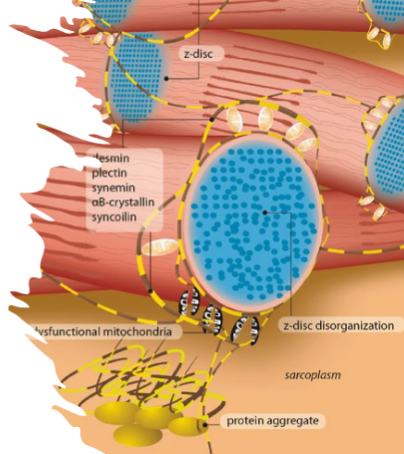Intermediate Filaments
1/22
There's no tags or description
Looks like no tags are added yet.
Name | Mastery | Learn | Test | Matching | Spaced |
|---|
No study sessions yet.
23 Terms
what is the DES gene?
located on chromosome 2q35 and encodes desmin
Expressed in striated muscles, including skeletal and cardiac muscles.
Disruption of normal assembly of desmin filaments, leads to the development of desminopathy
what is the CRYAB gene?
located on chromosome 11q22.3
Encodes alphaB-crystallin, a small heat shock protein
what is the alphaB- crystallin?
acts as a chaperone protein
Mutations can impair the chaperone function
what is the inheritance pattern of desminpathy?
can be inherited in an autosomal dominant or autosomal recessive manner
what is autsomal dominant desminopathy?
occurs when a single copy of the mutated gene is sufficient to cause the disorder
what is autosomal recessive desminopathy?
requires two copies of the mutated gene?
what are the clinical manifestations of desminopathy?
Pattern of muscle weakness in desmin-related muscle disorders
Lower limb muscle weakness slowly spreading to involve truncal, neck- flexor, facial and bulbar

what are the types of DES gene mutations?
mutations in the DES gene, which encodes the protein desmin
Missense mutations, nonsense mutations, frameshift mutations, and splice site mutations.
Missense mutations, which result in a single amino acid substitution – common type
what impact does mutations have on desmin assembly?
DES gene mutations disrupt the normal assembly of desmin filaments
Desmin is an intermediate filament protein
Mutations can impair the proper folding
what is filamentous network disruption?
Disorganization and loss of the filamentous network within muscle cells
Disruption weakens the structural integrity of the muscle fibers
Affects the connection between adjacent muscle fibers
what aggregates and cytoskeletal protein involvement?
Accumulation within muscle cells
Aggregates are composed of aggregated desmin / alphaB-crystallin and myotilin
what does MRI look for?
Magnetic resonance imaging
Muscle atrophy
Fatty infiltration
oedema
what are muscle biopsies confirming?
Assessing the histopathological changes
Presence of abnormal desmin aggregates
Cytoskeletal protein accumulation
Myofiber degeneration and regeneration
what type of staining is used in muscle biopsies?
Immunohistochemistry staining – identification of protein aggregates
what are the difference methods for diagnosing and genetic testing for desminopathy?
Diagnostic Approaches- Combination of clinical evaluation, imaging studies, muscle biopsies, and genetic testing.
Imaging Studies- Commonly used to evaluate muscle pathology in desminopathy
Muscle Biopsies- Confirming the diagnosis of desminopathy
Histopathology- identification of characteristic features
Genetic Testing- Confirming the diagnosis of desminopathy and identifying specific DES gene mutations
what is differential diagnosis?
Desminopathy shares some clinical features with other neuromuscular disorders
Limb-girdle muscular dystrophy, myofibrillar myopathy, and other forms of inherited
muscle disorders.
Clinical evaluation, imaging studies, muscle biopsies, and genetic testing crucial
what are the problems with distinguishing desminopathy?
Distinguishing desminopathy from other neuromuscular disorders can be challenging
Overlapping symptoms and pathological features
Presence of characteristic desmin aggregates and the identification of specific DES gene mutations key factors
what are the current treatment strategies for desminopathy?
There is no cure for desminopathy
Treatment primarily focuses on managing symptoms and improving quality of life
Combination of pharmacological and non-pharmacological approaches
what are the pharmalogical approaches for desminopathy?
Specific symptoms and complications
Cardiac manifestations, medications such as beta-blockers or antiarrhythmics
Control conduction blocks and arrhythmias
Heart failure, diuretics, ACE inhibitors, or angiotensin receptor blockers (ARBs)
Manage fluid retention and improve cardiac function
what are the therapeutic interventions for desminopathy?
Addressing Respiratory Muscle Weakness
Multidisciplinary Care
Physical Therapy and Rehabilitation
how may desminopathy impact quality of life?
Muscle weakness and fatigue can limit physical activities and mobility, leading to a loss of independence.
Pain, discomfort, and the progression of the disease may affect emotional well-being and mental health
what are the challenges in managing desminopathy?
The progressive nature of the disease necessitates ongoing adjustments to treatment plans and care strategies.
The complex nature of desminopathy requires a multidisciplinary approach, which may pose logistical challenges in accessing different healthcare professionals
what are the success in managing desminopathy?
Physical therapy and rehabilitation programs can improve muscle strength, mobility, and overall well-being.
Assistive devices and adaptive strategies may enhance independence and facilitate daily activities.
Emotional support, education, and community engagement can empower individuals and promote a sense of control over their condition